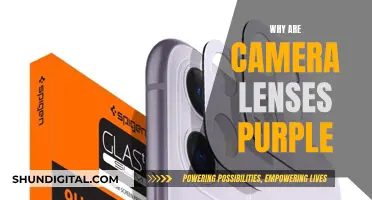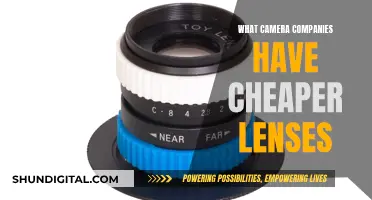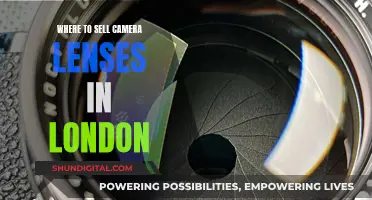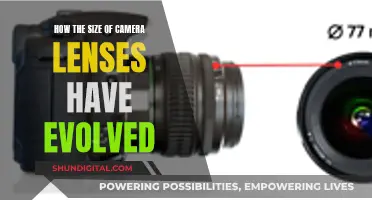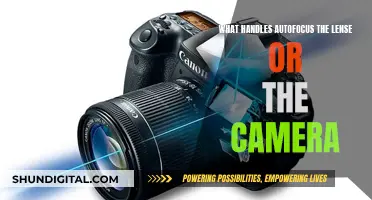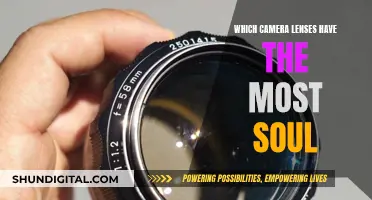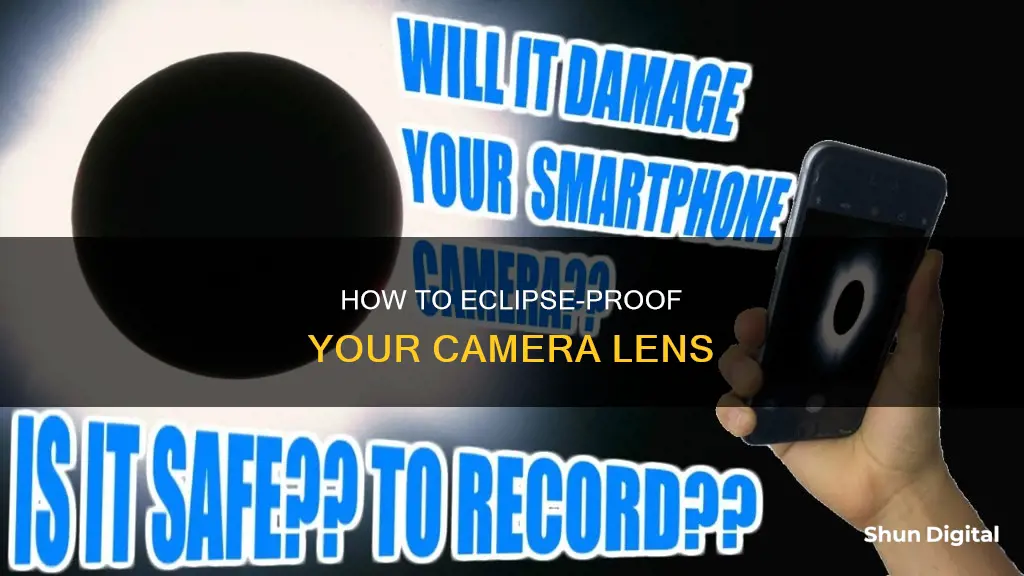
The sun's rays can damage camera lenses, and photography experts advise against pointing cameras directly at the sun. The ultraviolet rays can overwhelm and burn the sensor on any camera, including smartphones. This can lead to irreversible damage to the camera's internal elements, such as aperture blades and shutters. However, this usually occurs when the camera is left pointed directly at the sun for an extended period. To avoid damage, photographers are advised to use solar filters or ISO-certified eclipse glasses in front of the camera lens.
| Characteristics | Values |
|---|---|
| Can camera lenses be damaged by eclipses? | Yes |
| What causes the damage? | The sun's ultraviolet rays overwhelm and burn the sensor on any camera. |
| What type of damage can occur? | Melted camera lenses, burnt shutter systems, destroyed aperture blades, damaged internal elements (e.g. aperture blades, shutter), damaged sensors |
| How to prevent damage? | Use a solar filter over the lens, wear eye protection when looking through the viewfinder |
| Are phone cameras also at risk? | Yes |
What You'll Learn

Camera lenses can melt during an eclipse
It is important to understand the potential dangers of photographing an eclipse without the proper equipment. Camera lenses can, in fact, melt during an eclipse, and this phenomenon has been observed on multiple occasions.
Photography experts and camera rental companies have reported severe damage to cameras and lenses after users pointed them directly at the sun during an eclipse. The intense sunlight and heat can overwhelm and destroy the camera's sensor, as well as melt internal components such as the mirror and aperture blades.
Ultraviolet rays from the sun can burn the sensor on any camera, including digital cameras, DSLRs, mirrorless cameras, and even smartphones. The damage can range from dark spots on the sensor to completely frying the sensor, requiring a costly replacement.
To protect your camera equipment when photographing an eclipse, it is crucial to use a solar filter. These filters are designed to reduce the intensity of sunlight and heat reaching the camera's sensor. They are relatively inexpensive and can be found at major retailers or online. It is important to ensure that the solar filter is placed correctly in front of the lens, so all incoming light is filtered.
Additionally, it is advised to avoid prolonged exposure by taking quick shots and putting the camera down in between. This will help prevent damage to your equipment and allow you to safely capture images of this rare celestial event.
Universal Camera Lenses: A Myth or Reality?
You may want to see also

Sensors can be destroyed by heat
Digital cameras, DSLRs, mirrorless cameras, and smartphones all have sensors. These sensors can be overwhelmed and destroyed by the sun's rays, just as the rays can damage your eyes.
To protect your camera's sensor when photographing an eclipse, it is recommended to use a solar filter over the lens. These filters can be purchased for under $10 at major national retailers, or you can simply hold a pair of ISO-certified eclipse glasses over the camera lens when taking photos.
It is important to note that during any partial period of the eclipse, filters must remain on the camera at all times. They can be removed briefly during totality, but should be replaced as soon as totality ends.
Additionally, it is advised to avoid leaving your camera on a tripod pointed at the eclipse for an extended period. Taking a few quick photos with the camera placed on a surface between shots is less likely to cause damage.
Overheating can also occur when shooting long bursts or video, so it is important to be mindful of your camera's temperature and give it time to cool down if needed.
Camera Kit Lenses: Worth the Money or Worthless?
You may want to see also

A solar filter can protect your camera
Camera lenses can be damaged by solar eclipses, with some lenses even melting under the heat of the sun's rays. This is because the sun's rays are focused on internal elements like the aperture blades and the shutter, damaging them. In digital cameras, the sensor can also be damaged by prolonged exposure to intense light.
To prevent this, a solar filter can be attached to the camera lens. These filters are designed to protect the camera from intense sunlight and heat, as well as to prevent accidental direct viewing of the sun. They come in various materials, such as metal on glass, aluminized polyester film, and black polymer, and can be purchased relatively cheaply. It is important to ensure that the filter is securely attached so that it does not come off if bumped or in windy conditions.
During a total solar eclipse, it is safe to remove the solar filter from your camera lens, but only during the period of totality when the sun is completely blocked by the moon. It is important to quickly replace the filter as soon as totality ends.
It is also recommended to follow general photography tips for capturing a solar eclipse, such as using a zoom lens, a remote shutter, and a delay timer to reduce vibration. Additionally, photographers should remember to take the time to view the eclipse without the camera, as no photograph will be able to capture the true beauty of the event.
Japan's Camera Lens Market: Affordable Photography Superpower?
You may want to see also

Do not look through a camera with eclipse glasses
Looking at the sun through a camera lens without a solar filter can damage the camera and cause severe eye injury.
The sun's rays can overwhelm the sensors in sensitive photo equipment, such as digital cameras, DSLRs, mirrorless cameras, and smartphones. The intense light and heat can damage internal elements, such as aperture blades, shutters, and sensors.
It is important to note that solar filters must be attached to the front of any camera lens to protect both the camera and your eyes. These filters are different from eclipse glasses, which are designed to protect your eyes when viewing the eclipse directly. Eclipse glasses should not be used in place of a solar filter on a camera lens.
When using a camera to view an eclipse, it is crucial to seek expert advice from an astronomer and to ensure that the proper solar filters are in place.
Therefore, it is imperative not to look through a camera with eclipse glasses. Eclipse glasses are designed to protect your eyes from direct viewing of the eclipse and should not be used in conjunction with a camera. Doing so may result in serious eye injury and damage to the camera.
The High Cost of Camera Lenses: Why So Expensive?
You may want to see also

Photographing an eclipse: safety tips
Photographing an eclipse can be a rewarding experience, but it's important to take the necessary precautions to protect your eyes and equipment. Here are some safety tips to help you capture stunning images of an eclipse:
Use protective gear:
- Wear eclipse glasses or similar protective eye gear when aiming your camera at the eclipse.
- Use a solar filter over your camera lens to protect the sensor from the sun's rays. Solar filters are inexpensive and easily available.
- Never look through the viewfinder of your camera without a solar filter, as it can damage your eyes.
Prepare your equipment:
- Familiarise yourself with your camera settings before the eclipse. Know how to adjust exposures, focus, and shutter speed.
- Use a tripod to stabilise your camera and avoid blurry images.
- Use a remote shutter or delay timer to reduce camera shake.
- If using a smartphone, adjust the manual settings to reduce exposure and set the focus to infinity.
Capture the moment:
- Remove the solar filter during totality to capture the sun's outer atmosphere, but remember to put it back on before totality ends.
- Experiment with different lenses and viewpoints. Use a telephoto lens to capture details or a wide-angle lens to include the landscape or people in your shot.
- Don't forget to put down the camera and enjoy the eclipse with your own eyes!
Take creative shots:
- Include the landscape or people around you in your photos to give a sense of place and perspective.
- Look for natural pinholes, such as the spaces between leaves on trees, to capture interesting projections of the eclipse.
- Focus on the human experience of watching the eclipse and capture the emotions of those around you.
Remember to always follow safety guidelines and never look directly at the sun without proper eye protection, even during totality. With these tips, you'll be well on your way to capturing unforgettable images of an eclipse.
Best Places to Sell Your Camera Lenses Online
You may want to see also
Frequently asked questions
Yes, camera lenses can be damaged by eclipses. The sun's ultraviolet rays can overwhelm and burn the sensor on any camera.
You can protect your camera lens by using a solar filter. These are available for under $10 at major national retailers.
Without a solar filter, the camera's sensor will be exposed to the sun's rays and may be damaged. This can result in a dark spot on the sensor, or the lens may even melt.


